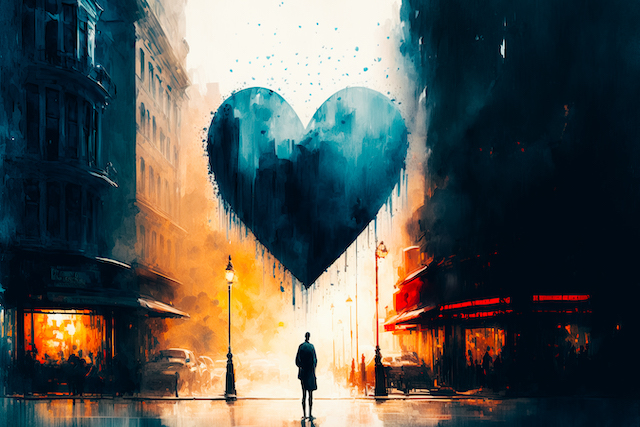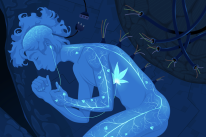
“Empaths did not come into this world to be victims, we came to be warriors. Be brave. Stay strong. We need all hands on deck.” ~Anthony St. Maarten
From the moment I entered this world, I strongly felt others’ pain. Especially those in my house. They were not okay, and I felt it deeply.
Their intense negative emotions made me feel unsafe. I lived with my parents and my grandparents. Two generations of oppressed and abused women, whom I loved so much.
The men weren’t all bad. They were gentle, deep, and loving. But then they would switch into heavy drinking and explosive tempers. Jekyll and Hyde, both my dad and grandad.
I felt both their darkness and their light and believed maybe I could fix them.
From a very young age, I unconsciously noticed that sometimes my energy, love, and light would calm the environment down.
If I hugged my mum when she was upset and sad, sometimes her energy would shift and she’d smile. Then I would feel safer.
When my grandmother was sick, I would play with her, and I could see hope in her eyes. A little pain had left her body.
I noticed if I did what my dad wanted, his temper was a little calmer and I would see my nice dad. He was happier.
So, from a very young age, I learned that my superpower of feeling others’ emotions could keep me safe.
I felt like I had to take care of others, please them, try to fix them, and regulate their emotions by being the place they worked through them .
I was okay if everyone else was okay. Then I was safe. Well, so my child brain thought! All unconscious, of course.
I learned to give away my power in order to feel some kind of emotional safety. I learned to deeply understand other people’s needs but be disconnected to my own.
This won me a Favorite Daughter and Granddaughter Award, but the problems in my house got worse over the years.
Three out of the four adults I lived with have died due to their trauma. My dad took his own life, my grandad drank himself to death, and my grandmother had serious health issues, which I now see was linked to her fear.
I didn’t exactly help them with these patterns, despite trying to fix them. However, these coping strategies I learned as a little girl stayed with me.
I believe they robbed me of my own happiness because I knew how to take care of others but had no idea how to love myself.
This manifested as an adult in the following ways.
1. I was needless and wantless.
I did not even recognize my own needs and had no idea what my dreams were. Somewhere along the way I formed an unconscious belief that my needs did not matter. That I existed for everyone else.
I was validated as a child for being there for others. I even received love! So I learned to put other people first and lock away my own desires.
I was constantly starving for love and attention. Looking for it externally and always thinking someone else could give me what I couldn’t give myself.
I had no concept of self-care. Everything was about everyone else. I had no idea what self-love even meant, nor did I realize I was neglecting myself of my own basic needs.
2. I was always in toxic relationships.
I lived for other people, which meant I was a doormat for people who were obsessed with their own needs.
I was on an emotional rollercoaster with other people and their emotions, whether in friendships, family relationships, or romantic relationships.
I constantly gave more than I received. I thought if I shone my light, loved, and gave to them, then they would be okay. But they weren’t.
I was the place they were taking it all out. I had no boundaries, so they could do what they liked. They could have an emotional outburst and I would take it.
They could give me the silent treatment and blame me for their emotions, and I would apologize.
They could speak to me awfully one minute and then be loving the next, and I would be fine with it all.
But on the inside, I was in so much pain. Their treatment was confirming my destructive beliefs. I was not worthy of love, and if other people were not okay, I didn’t receive it.
3. I turned to emotional eating and found comfort in gaining weight.
Feeling other people’s pain and ignoring my own didn’t feel good. None of the adults around me showed me how to deal with this.
Food, however, was an easily accessible comfort, and it helped me soothe the pain. I was sneaking off to the kitchen at night to eat a tub of ice cream. This helped me numb all the emotions I felt—my own and other people’s.
I started to put weight on as a young child. It felt like a protection for all that was dark in the world.
Don’t get me wrong, I hated being fat, and a war began with my body to diet. But when I had fat on me, I felt like I could disappear and it felt a bit safer—all unconsciously, of course.
4. I was constantly lonely.
I chased love from emotionally unavailable men. Either they were addicts or in unhappy relationships. If I could sense they needed fixing, then I was all in! I made it my life’s mission to make them happy and made myself miserable in the process.
It was all about them and never about me.
One man in particular changed, inspired by my love, but then I felt suffocated by his needs and ran away from the relationship.
I was always single. Either years of no relationships or years chasing unavailable love, and sometimes I ran away.
All scenarios meant I was alone and feeling the constant ache for love. One I struggled to fill.
I had great friendships, on the other hand, and one friend said to me, “Why are you always in love with these projects?” I didn’t know the answer then, but I now know I believed that was all I was worth, and I was disconnected from my own needs.
5. I experienced suicidal ideation.
I didn’t see the point of my life. I felt like the side act in other people’s stories. The Maid of Honor who would throw the perfect baby shower. But my friends had no idea how I struggled.
I wore a mask of happy and together, but inside I was full of self-hate. I was exhausted from taking care of others and being the place where they worked out their emotions.
I never had a plan to kill myself, as I couldn’t hurt other people. I was living to please others, and I knew my suicide would break their hearts, but I wasn’t living because I actually wanted to.
6. I was addicted to saving others.
I was almost obsessed with filling my time with everyone else and their needs. When I had a moment to myself, my pain would float up, and I avoided it at all costs.
My schedule was busy pleasing others, doing things they never even asked me to do and trying to fix their pain.
At the time I didn’t know my behavior was an addiction called codependency. It was even recognized by a fellowship! Codependents Anonymous. Literally a group was formed, as helping others was destroying people’s lives.
Change felt excruciating, as I had to feel the pain underneath my compulsion and make difference choices. I had to finally learn how to love myself and shine that light within.
7. I felt powerless.
I was trapped in the drama triangle! I was either rescuing people from relationships that made them feel powerless or being the victim myself in relationships where I was bullied but too scared to stand up for myself and set boundaries.
Other people’s pain felt more important than mine, which is why I would run away from confrontation. I was constantly allowing others to discharge their emotions and not protecting myself.
8. I hid away to avoid other people’s emotions.
The world and its problems felt like a lot. It still does at times, which is why I don’t watch the news. It literally makes me cry.
I used to hide in my room, eat, fantasize, and binge-watch Grey’s Anatomy, sobbing.
But now I notice this behavior means I need my own love, care, and emotional regulation. I can bring myself back into balance, no matter what is going in the world.
—
The little empathic girl grew up to learn that loving and healing herself was the way to spread her light in the world.
I now get to serve and help others from a healthy place, while caring for myself, which feels like the best job in the world.
I found a romantic relationship and am now married to a man who grounds me and feels safe. His love is available daily, and even if it isn’t, I now know how to love myself.
I found my dreams and live them every day.
If you can relate to anything I wrote, I hope you’ll do the work to heal your wounds so that you don’t spend your life painfully fixated on everyone else’s wants and needs. Then you can go out into the world and help people from a healthy place—without worrying about pleasing or fixing them—and most importantly find your heart’s happiness first!
It starts with digging deep to understand why you’re focusing all your energy on other people and facing the pain you’re avoiding by trying to fix them. It isn’t an easy process, and it might mean therapy, journaling, and lots of time sitting with your feelings, but you will eventually make progress if you commit to the work. And the beautiful thing is that by tending to your own wounds and issues you’ll likely inspire others to face theirs.
Leading by example creates a ripple effect of healing into the world.
About Manpreet Johal Bernie
Manpreet is the creator of the podcast Heart’s Happiness, where she talks about intergenerational trauma, and is also a coach who helps people make peace with their past and rewrite their story by learning how to love themselves and their inner child. Check out her FREE MASTERCLASS, Freedom from Anxiety, where she shares her proprietary technique to help with anxiety. Follow her on Instagram here.
- Web |
- YouTube |
- More Posts













 Though I run this site, it is not mine. It's ours. It's not about me. It's about us. Your stories and your wisdom are just as meaningful as mine.
Though I run this site, it is not mine. It's ours. It's not about me. It's about us. Your stories and your wisdom are just as meaningful as mine.
Very well written 👍😊. As a former people pleaser, I know just how destructive neglecting one’s own needs can be and yet not realizing just how important we are ourselves because of the lack of our own self worth. I’m very proud of you for the courage you have shown in giving yourself a better life.
Thank you, I can definitely relate to this & have started to change my ways including loving myself. Only sorry did not realise what was happening sooner. ❤️